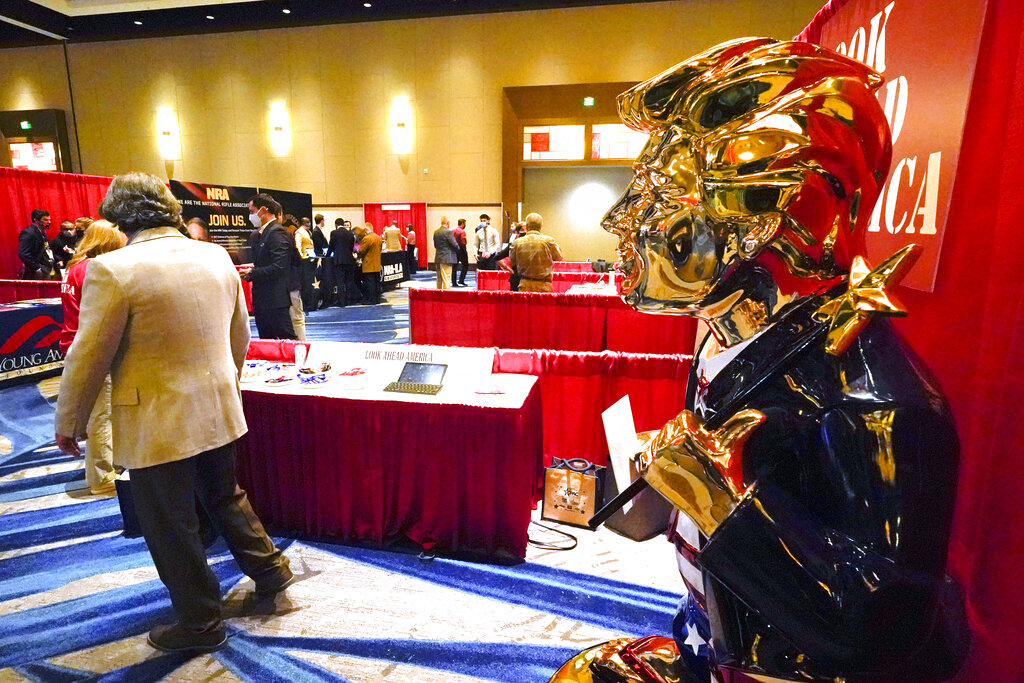
Fear is what that golden Trump statue really has in common with the Golden Calf
 Just when it seemed the apotheosis of Donald Trump couldn’t get any more absurd, video surfaced late last month of “an outrageously golden statue” of the former president being wheeled into the 2021 Conservative Political Action Conference (CPAC). Six feet tall, wearing U.S. flag-themed shorts and holding a copy of the Constitution in one hand and a magic wand (!) in the other, this gaudy icon seemed to epitomize the adulation of Trump’s base for their Dear Leader.
Just when it seemed the apotheosis of Donald Trump couldn’t get any more absurd, video surfaced late last month of “an outrageously golden statue” of the former president being wheeled into the 2021 Conservative Political Action Conference (CPAC). Six feet tall, wearing U.S. flag-themed shorts and holding a copy of the Constitution in one hand and a magic wand (!) in the other, this gaudy icon seemed to epitomize the adulation of Trump’s base for their Dear Leader.
Critics were quick to draw comparisons to what amounts to the obvious biblical story: “Apparently CPAC attendees missed the part of the Bible about the Golden Calf,” wrote Vox correspondent Zack Beauchamp. “The party’s base is so committed to the former president that they construct idols of him, literally, to stand up at their premier political conference.” Longtime conservative and outspoken Trump critic Bill Kristol tweeted an artist’s rendering of the ancient Israelites worshiping the Golden Calf, with the caption “Live image from CPAC.” “Idol worship isn’t conservative. #RestoreOurGOP,” tweeted Rep. Adam Kinzinger (R-Ill.), one of a handful of GOP members of Congress who voted to impeach Trump after the January 6 insurrection.
Idolatry? Sure, and in spades. But there’s a deeper connection between the biblical Golden Calf and the Golden Trump in that they share a common underlying motivation. That, in a word, is fear — in this case, a remarkably similar brand of metathesiophobia (fear of change), or perhaps a fear of perceived change.
Though the Golden Calf episode, found in the biblical book of Exodus, is often read as an object lesson on the dangers of idolatry, it’s also very much a story about fear and its consequences. Exodus opens with the Israelites, refugees in Egypt due to a famine in their Palestinian homeland, suffering “ruthless” oppression at the hands of Pharaoh and his officials. (There, the reader might be reminded of the sufferings that refugees experienced under the Trump administration’s draconian anti-immigrant policies. But that’s a story for another article.) Then the God of the Israelites visits their oppressors with those familiar 10 plagues and delivers the Israelites from bondage under the charismatic leadership of Moses, with Pharaoh’s chariots hot on their heels.
Once they reach freedom, the Israelites find themselves in the wilderness of the Sinai desert, with no natural supply of food or water and under attack from hostile inhabitants. Fearing for their very survival, they long for Egypt, where they may have been slaves, but at least they had food.
God steps in again, not only to supply the Israelites with miraculous nourishment in the wilderness, but also to establish a covenant with them, promising to make them a “holy nation” if they will follow God’s Law, including the Ten Commandments.
But when Moses leaves them for an extended period to receive additional instructions from God, the Israelites fear they have been abandoned by their leader and by God. They make an idol, a golden calf, offer sacrifices to it, and begin what one scholar calls “orgiastic, frenetic” celebrations at the foot of the image. (The equally frenzied January 6 attack on the Capitol by Trump followers comes to mind here.) When Moses returns, his people’s behavior so infuriates him that he smashes the stone tablets of the divine Law.
As with most parts of the Bible, the meaning of the Golden Calf is subject to a wide range of interpretations. For my money, the most convincing reading is that of Jewish scholar Allan M. Langner. He argues that the Golden Calf represented the Egyptian bull-god Apis, a deity the Israelites “had known and perhaps worshipped in Egypt.” In other words, the Israelites, fearful of the uncertainties of their new circumstances, and despite evidence of God’s continuing providence, returned to the bull-worship they knew from Egypt. They looked to the past rather than trusting God to guide them forward through those uncertainties. Read this way, the episode of the Golden Calf is a story about fear, and how fear can undermine faith.
And it’s a very similar type of fear that ties today’s Trump supporters to the bull-worshipping ancient Israelites. Beneath the slavish devotion to Trump symbolized in that tacky golden statue at CPAC lies a deep-seated fear of cultural and political change and the loss of white, patriarchal Christian dominance.
This is especially true of an influential segment of die-hard Trump supporters, whom I’ve studied for the past several years: Christian nationalists. Much as the ancient Israelites turned back to the worship practices of Egypt, Christian nationalists call for a return to a mythical “Christian America,” when Christianity supposedly governed U.S. law and public policy. And they believe that Trump, with his vague yet apocalyptic call to “Make America Great Again,” is the one to deliver.
“Christian nationalists tend to believe that Christians are under attack and are being persecuted. That leans towards a worldview that increasingly includes a lot of fear: us-versus-them dichotomy, forces beyond our control are steering events against [Christians],” argues Paul D. Miller, an international affairs professor at Georgetown.
Similarly, sociologists Andrew Whitehead and Sam Perry observe that “Americans who pine for Christianity’s former prominence in American civic life feel threatened and marginalized. They fear that their values and priorities will, at best, no longer be dominant.” Christian nationalism, Whitehead and Perry write, “is used to defend against shifts in the culture toward equality for groups that have historically lacked access to the levers of power,” including Black folks, women, LGBTQ2+ Americans, immigrants, and religious minorities.
So the idol isn’t so much Trump himself, or that golden statue at CPAC. The idol is power — the cultural and political power Trump’s followers believe they’re losing but can regain under his leadership. Trump has simply found a way to manipulate that fear for his own aggrandizement — a sharp contrast with the “very humble” Moses.
There’s another similarity between Trump’s Christian nationalists and the biblical story. Much as the newly liberated Israelites focused on the hardships of their changed circumstances rather than the signs of God’s continuing providence, so Trump’s Christian nationalist followers seem unable or unwilling to see the possibility that the very cultural and political changes they dread may be in accord with God’s will.
Namely: Just because something is new or different doesn’t mean it is contrary to the divine will. For instance, few U.S. Christians today would contend that democracy and racial equality contradict biblical teaching. Yet in the 19th century, scholar Daniel Philpott notes, the nascent democratic movement came under attack by the Catholic papacy; Pope Pius IX in 1864 assailed religious freedom and church-state separation, cornerstones of American democracy. And nearly a century later, in the wake of the 1954 Brown v. Board of Education decision, many Southern white Christians claimed that ending Jim Crow violated divine law. “God created and established the color line in the races,” wrote one Baptist, and a minister in Virginia warned that racial integration “is but another stepping stone toward … gross immorality and lawlessness.” (These ludicrous claims were foreshadowed back in the late 17th century by the Puritan leader Cotton Mather, who, as Ibram X. Kendi discusses, argued that slavery was part of God’s plan and equated anti-slavery activists with the Devil.)
What those Christians should have been asking then — and what Christians of all stripes should be asking today — is this: Is a given social change consistent with a God who is just and compassionate? In the words of Mary’s Magnificat in Luke’s Gospel, does it scatter the proud, lift up the lowly, fill the hungry with good things and send the rich away empty? Does it bring good news to the poor, proclaim release to the captives and let the oppressed go free? In terms of today’s context, does it allow refugees to escape danger and death? Does it treat our neighbors, including those who differ from us, as we ourselves would want to be treated? Does it — in the words of the prophet Amos — “let justice roll down like waters”?
By seeking to maintain white Christian power and return to a past that never was, the Christian nationalist agenda, and Trump’s MAGA project generally, fails those tests as badly as did papal opposition to democracy or Southern white attempts to maintain Jim Crow. It’s an agenda based in fear, not faith.
“There is no fear in love, but perfect love casts out fear,” the author of 1 John teaches. Even though, in the final analysis, “Golden Trump” is as hollow and impotent as the Golden Calf, the fear that motivates the idolization of white Christian dominance can be very potent: It casts out the love that Jesus and his immediate disciples tried to spread — and thus forsakes the religion Trump’s Christian followers believe they’re defending. Those are the real dangers in this new idolatry.
David R. Brockman, Ph.D., a religious studies scholar and Christian theologian, is a nonresident scholar in the Religion and Public Policy Program at Rice University’s Baker Institute. He also teaches at Brite Divinity School and Texas Christian University. His articles have appeared in Texas Observer, Religion Dispatches, Scalawag, and other publications. He is the author of No Longer the Same: Religious Others and the Liberation of Christian Theology (2011) and Dialectical Democracy through Christian Thought: Individualism, Relationalism, and American Politics (2013).
